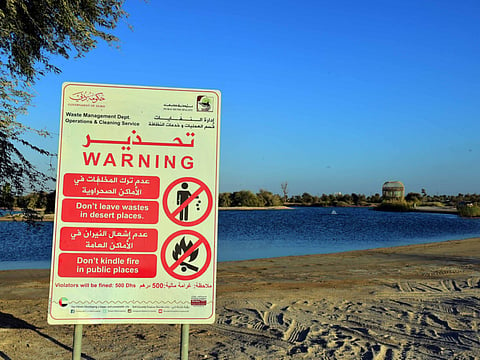Eco-group backs Al Qudra camping ban
Waste left behind in Al Qudra Lakes by campers violates long-standing principles of leave no trace during wilderness visits

Dubai: Banishing overnight campers and makeshift campfires from Al Qudra Lakes is a step in the right direction to protect the nature reserve, a senior environmentalist said on Wednesday.
Habiba Al Marashi, chairperson of the Emirates Environmental Group (EEG), lamented that campers are leaving broken glass, abandoned fire pits, aluminium pop cans and plastic bottles as well as discarded bags of food waste that are often fatal for wildlife.
“This has reached a level that is completely not acceptable,” said Al Marashi, who founded the EEG’s Clean Up UAE 16 years ago. “People can no longer enjoy going to Al Qudra because they are generating too much waste. The problem is that because of the irresponsible behaviour of a few, it is impacting everyone.”
As many as EEG 10,000 volunteers will spread out across Dubai this Saturday, including Al Qudra, as part of the EEG’s annual eco clean-up, said Al Marashi, which collected 110,000 kilograms of garbage across the country in 2016.
“Our volunteers will visit Al Qudra this weekend and clean up as much as they can to help,” Al Marashi said.
Gulf News reported earlier this week that new Al Qudra Lakes area signboards are warning visitors not to camp overnight, litter, strike fires or walk dogs on the grounds to help protect dozens of bird species that stop over on their migratory routes.
Breaching the no-camping ban will invite fines of Dh500.
Dr Reza Khan, principal wildlife specialist at Dubai Safari and Dubai Municipality, told Gulf News earlier this week that the ban on campers is essential in a protected area.
“The government has planted hundreds of trees and developed the lakes for preserving the environment and for the betterment of the birds and animals,” he said. “This place was never meant to be a picnic area or dog walking site. But, because they were not prevented, people just started coming in and camping here and walking their dogs.”
Gulf News readers have complained for years about thoughtless polluters disposing of their waste at places such as Al Qudra and at wadis.
One reader wrote in March this year that she was disgusted to return to Al Qudra Lakes area and see it in such disarray.
“I was amazed that I didn’t see any migratory flamingos present and was shocked to see all the birds so alert. They were disturbed by the number of cars parked at the edge of the lake, with dogs chasing birds, children throwing food/plastic into the lake, and people using firewood barbecues, with smoke rising close to the lake. It was such a sad sight,” wrote Ms Nithya.
“The way people are littering, with no respect for the lake or concern for the birds, is so disappointing, especially when there is a signboard warning people of a fine. If visitors to the lake continue treating this area the same way, I feel we will no longer see migratory birds gracing the lake. I hope we can bring about a change.”
According to Leave No Trace Canada, an organisation dedicated to minimising the impact of humans on natural areas, people should commit to keeping wild areas the way they found them.
“Many of us have taken a pine cone or rock, veered off the trail to dodge mud puddles, gotten too close to wildlife or tossed an apple core into the woods. While these actions may seem harmless at the time, until we learn to reduce our impact, the quality of our outdoor experiences and the recreational resources we enjoy are at critical risk,” says the group on its website.
“Also at risk is our continued access to wild lands as land management agencies sometimes take restrictive action to protect the resources they manage. Unless, of course, education catches up with behaviour, and we all learn to leave the outdoors as unchanged as possible by our presence.”
- Leave no trace
- Dispose of waste properly
- Leave what you find
- Minimise campfire impacts
- Respect wildlife
- Be considerate of other visitors
- Source: www.leavenotrace.ca



